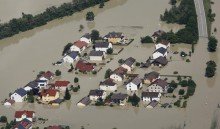The words “unprecedented flooding” seem to sum up the helplessness of governments pitted against a perfidious Nature, unable to predict random occurrences. Flooding has always been with us, and there is nothing that can be done against a unique happening. Unless, of course, the “unprecedented” bit is an outright lie: I would argue that it is.
In any “normal” situation, flooding is part of the natural order of things. In fact, in the longer term, it is beneficial. It spreads fertile silt over cultivable flatlands, or flood plains, allowing the successful cultivation of crops. This is why flood plains have been the birthplaces of modern civilization – the Nile, the Euphrates etc.
With the increasing use of chemical fertilisers, flooding ceased to be a part of agriculture and became a nuisance; something to be restricted and constrained in channels and solid banks. This did not, however, inhibit the practice of building on flood plains, largely down to urban proximity (jobs, services, infrastructure) and ease of construction: hence profits! In a warming world, driven by capitalist production in a fossil economy, this was a recipe for disaster. The construction of of flood defences and the resulting constriction of flood waters intensified the effects of flooding further downstream.
Add to this the effects of an ancient sewage and storm water system, and the problem is magnified. Most of our core urban sewage system is Victorian, brick built or in clay pips, and prone to collapse. When it has done so, it has been replaced piecemeal, adding further stress to the remaining older parts. New, suburban housing has nice, new pipework and sluices, but these frequently empty into the old, core system, sampling adding to the problem. The Victorians were not unaware of problems even then, which is why the rich lived on the hill: shit flows downhill.
The farming system is not free of problems regarding flooding, either. Land use has had a major effect on flooding. A widespread move from winter to spring sowing leaves ploughed land open to the elements over the winter. In a “normal” winter, ice and frost breaks down the soil, making sowing easier. In a warmer and wetter “normal”, it merely facilitates soil breakdown and run-off as silt. Straight lines of maize plantations worsen the effect.
There has been a bonfire of regulations under recent governments which has had a significant worsening effect. The benefits of dredging rivers can be over- stated, given the destruction of habitat, but done scientifically, it can help water distribution. The preservation of natural waterways has been used as a smokescreen to cover up massive cuts in the Environment Agency. This has rendered its ability to maintain waterways largely ineffective. A whole raft of flood prevention measures was put on hold due to budget cuts. The last Labour Government had a budget for such measures up to 2021: the last two Tory Governments have slashed £1 billion from that Budget.
Agribusiness and the National Farmers Union (read: Multinational Big Farming) have demanded that we trust Big Farming to act responsibly and self-regulate. The results have proved we cannot! George Monbiot has penned a new meaning for the DEFRA (Department of Environment, Food and Rural Affairs) acronym: “Doing Everything Farmers’ Representatives Ask”! Big Farming is propped up by £3.6 billion of public money each year. The subsidies used to be dependent on soil preservation measures, but the last ConDem government removed this requirement. Worse, Maize, the crop most destructive of soil integrity, had ALL regulation removed! Maize has gone from 1,400 to 160,000 hectares between 1970 and 2013. A 2013 study in Somerset indicated that three quarters of Maize fields surveyed had lost soil integrity. The lack of stubble or weeds in those fields had reduced soil absorption and increased run off, and the straight lines of maize, ignoring hill erosion, worsened it. The Maize is not even used for consumption, but feeds the biofuel industry; a fake-ecological “alternative” energy source. Fuel oil Maize also receives large European subsidies.
All of this has been known for some time, at the very latest by 2013 and in most cases much earlier. This is no surprise occurrence of unprecedented natural phenomena, but an entirely predictable result of capitalist mismanagement of the micro- and macro- ecology. Austerity and the profit-based economy is entirely unable to restore flood safety, just as it is incapable of feeding the world. We need system change to overcome climate change.
(Thanks to George Monbiot, Guardian 18/12/15)







